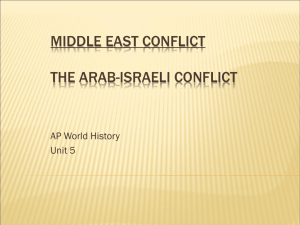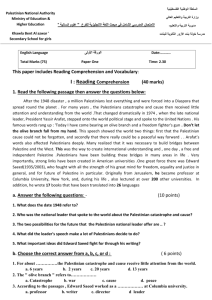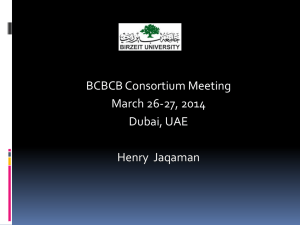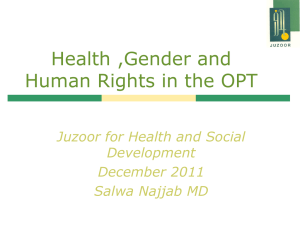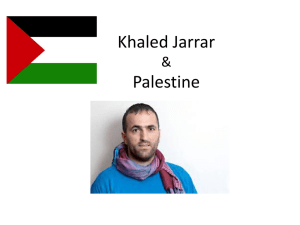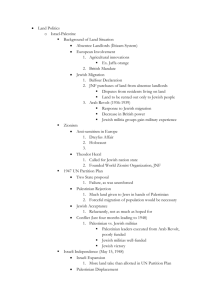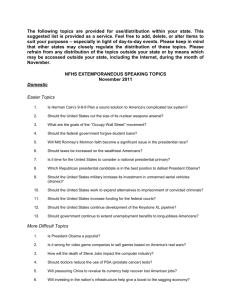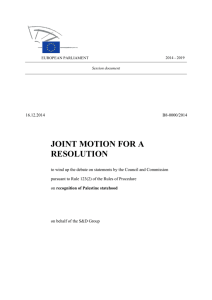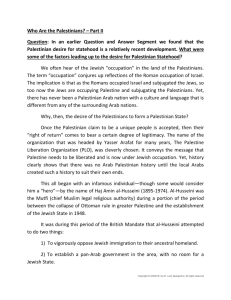مدرسة بني سهيلا الابتدائية المشتركة "ب"
advertisement
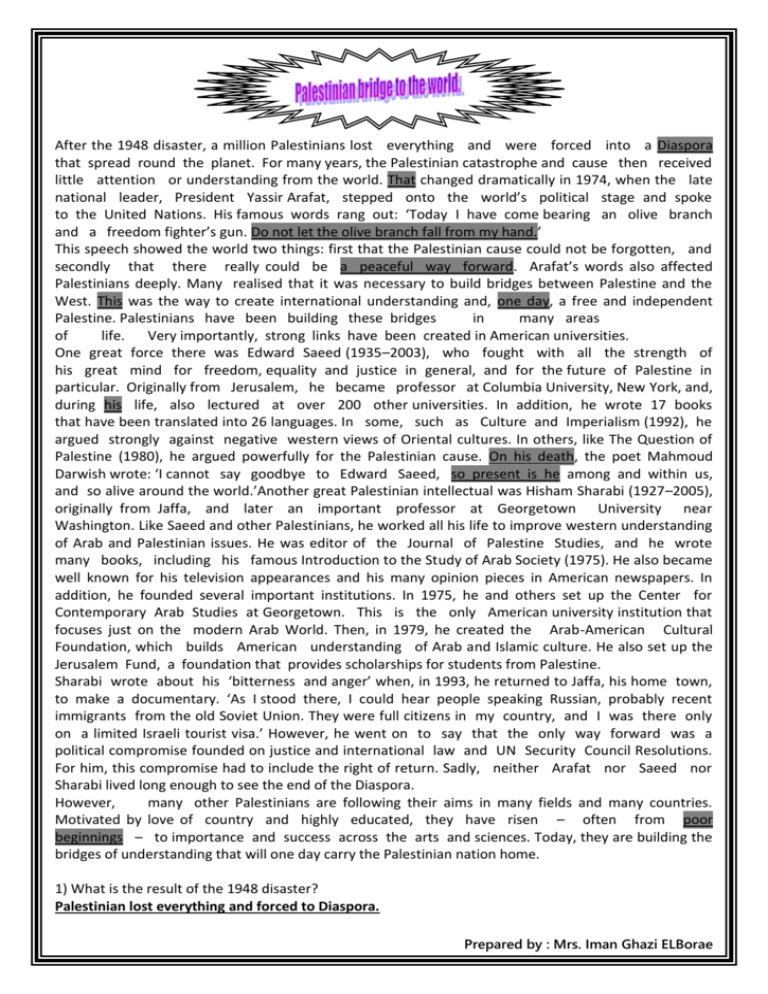
After the 1948 disaster, a million Palestinians lost everything and were forced into a Diaspora that spread round the planet. For many years, the Palestinian catastrophe and cause then received little attention or understanding from the world. That changed dramatically in 1974, when the late national leader, President Yassir Arafat, stepped onto the world’s political stage and spoke to the United Nations. His famous words rang out: ‘Today I have come bearing an olive branch and a freedom fighter’s gun. Do not let the olive branch fall from my hand.’ This speech showed the world two things: first that the Palestinian cause could not be forgotten, and secondly that there really could be a peaceful way forward. Arafat’s words also affected Palestinians deeply. Many realised that it was necessary to build bridges between Palestine and the West. This was the way to create international understanding and, one day, a free and independent Palestine. Palestinians have been building these bridges in many areas of life. Very importantly, strong links have been created in American universities. One great force there was Edward Saeed (1935–2003), who fought with all the strength of his great mind for freedom, equality and justice in general, and for the future of Palestine in particular. Originally from Jerusalem, he became professor at Columbia University, New York, and, during his life, also lectured at over 200 other universities. In addition, he wrote 17 books that have been translated into 26 languages. In some, such as Culture and Imperialism (1992), he argued strongly against negative western views of Oriental cultures. In others, like The Question of Palestine (1980), he argued powerfully for the Palestinian cause. On his death, the poet Mahmoud Darwish wrote: ‘I cannot say goodbye to Edward Saeed, so present is he among and within us, and so alive around the world.’Another great Palestinian intellectual was Hisham Sharabi (1927–2005), originally from Jaffa, and later an important professor at Georgetown University near Washington. Like Saeed and other Palestinians, he worked all his life to improve western understanding of Arab and Palestinian issues. He was editor of the Journal of Palestine Studies, and he wrote many books, including his famous Introduction to the Study of Arab Society (1975). He also became well known for his television appearances and his many opinion pieces in American newspapers. In addition, he founded several important institutions. In 1975, he and others set up the Center for Contemporary Arab Studies at Georgetown. This is the only American university institution that focuses just on the modern Arab World. Then, in 1979, he created the Arab-American Cultural Foundation, which builds American understanding of Arab and Islamic culture. He also set up the Jerusalem Fund, a foundation that provides scholarships for students from Palestine. Sharabi wrote about his ‘bitterness and anger’ when, in 1993, he returned to Jaffa, his home town, to make a documentary. ‘As I stood there, I could hear people speaking Russian, probably recent immigrants from the old Soviet Union. They were full citizens in my country, and I was there only on a limited Israeli tourist visa.’ However, he went on to say that the only way forward was a political compromise founded on justice and international law and UN Security Council Resolutions. For him, this compromise had to include the right of return. Sadly, neither Arafat nor Saeed nor Sharabi lived long enough to see the end of the Diaspora. However, many other Palestinians are following their aims in many fields and many countries. Motivated by love of country and highly educated, they have risen – often from poor beginnings – to importance and success across the arts and sciences. Today, they are building the bridges of understanding that will one day carry the Palestinian nation home. 1) What is the result of the 1948 disaster? Palestinian lost everything and forced to Diaspora. Prepared by : Mrs. Iman Ghazi ELBorae 2) How does the Palestinian cause change in 1974? When President Arafat stepped onto the world's political stage and spoke to the United States. 3) What were Arafat's famous words? 'Today I have come bearing an olive branch and a freedom fighter's gun. Don't let the olive branch fall from my hand.' 04) What are the tow possibilities that Arafat offer in his words? Peace and war. 05) Arafat's words reflected two important things. What are they? 1. Palestinian cause couldn't be forgotten. 2. There could be a peaceful way for the world. 3. Building bridge between Palestinian and the west is important. 06) How did his speech affect Palestinians ? They realized that building bridge between Palestinian and the west is important. 07) What is the outcome of building bridges between Palestine and the world? 1. International understanding. 2. Free and independent Palestine. 08) Give an example of linking between the world and Palestine? Edward Saeed and Hisham Sharabi at American universities. 09) What did Edward Saeed fight for in general and in particular? In general, he fought for freedom, equality and justice. In particular, he fought for the future of Palestine. 10) Where did he come from? Where did he work? He came from Jerusalem. He worked at Columbia University. 11) What were his written deeds? He wrote 17 books such as 'Question of Palestine ' , 'Culture and Imperialism' . 12) What is his book 'Culture and Imperialism' about? In this book he argued against western view of oriental cultures. 13) How did Sharabi create better understanding of Arab and Palestinian issues? 1. He founded many institutions. 2. He was editor of the journal of Palestine studies. 3. He wrote many books and wrote to newspapers. 4. He spoke on television. 14) Why did Sharabi turn back to jaffa ? In order to make a documentary. 15) How was Arafat bold and determinative? He spoke to the UN and offered two possibilities peace and war. He makes the world feels that he is able to fight. 16) What does the writer mean by the bridges? Building relations between Arabs and the West. 1 17) Why did Shrabi translate his books in many languages? To improve the western understanding of the Arab culture. 18) What were the words that said as a compliment and lamentation for Edward Saeed? ' I cannot say goodbye to Edward Saeed , so present is he among us and within us, and so alive around the world.' 19) How do you know that the western understanding of Arabs is bad? Edward and Sharabi worked all their life to improve the Western view of the Arab nation. 20) How did Shrabi become famous? He became famous for his television appearance and his opinion pieces in American newspaper. 21) Shrabi felt disappointed when he returned to Jaffa. Explain? When he heard people speaking Russian in his country, they were full citizens in his country and he was there on a limited Israeli tourist visa. 22) What did Hisham Sharabi do for students in particular? He founded Jerusalem Fun to provide scholarships for Palestinian students. 23) Has the work of building bridges stop aftr the death of Saeed and Sharabi? No, many Palestinians followed their aims in many fields and countries. 24) What did Sharabi create in 1975? He founded the centre for contemporary Arab Studies in Georgetown. 25) Why can’t Mahmoud Darwish say goodbye to Edward Saeed ? Because he is still in our hearts by his writing deeds. 26) Why did Sharabi establish 'Arab-American Cultural Foundation'? To build American understanding of the Arab and Islamic culture. 27) What is the goal of setting up the Jerusalem Fund? To provide scholarships for Palestinian students. 28) What should the political compromise be based on according to Sharabi? It should be based on justice, international law, UN Security Council Resolutions. 29) What was the condition to go ahead in Sharabi's, Edward's and Arafat's view? Motivated by love of country and highly educated. 30) What was the common pain and bitterness that Arafat, Shrabi and Edward share? They didn't live long enough to see the end of Diaspora. 31) What was the emotion that makes who follow Arafat,Edward and Sharabi enthusiastic? They are building the bridge of understanding that will one day carry the Palestinian nation home. 32) Complete: 1) Edward Saeed came from Jerusalem. 2) Important connections between Palestinian and the world were first made in America. 3) Edward communicated his ideas in his 17 books. 2 4) In 1948, the Palestinian cause received little attention from the world. 5) According to the passage, Edward Saeed worked as professor at Columbia university. 6) Jerusalem Fund is to provide scholarships for Palestinian students. 7) The only motivation for those who followed arfat,Saeed and Sharabi is love of the country. 8) Edward and Shrabi discussed in their books negative views of oriental cultures. 33) Decide whether the following sentences are tru..e or false: 01) Edward Saeed and Sharabi discussed in their books the negative western views of Palestinian cultures. (T ) 02) Jerusalem Fund was created in Jaffa by Sharabi. (F ) 03) Hisham Sharabi entered Jaffa by Israeli passport. (T ) 04) Those who followed Arafat have started with no or few advantages. (T ) 05) Hisham Sharabi created four foundations, three in America and one in Palestine for strudents. ( ) 06) Sharabi didn't have condition about the political compromise. (F ) 07) The only motivation for those who followed Arafat is patriotism. (F ) 08) After the Palestinian catastrophe, their issues received great attention. (F) 09) Arafat's speech had no effect on the international community. (F ) 10) Arafat's words suggested that right could be only returned by power. (F) 34) Give a word from the passage that means: world…planet disaster…catastrophe liberty…freedom issue…cause/question especial…particular established…set up/founded rifle…gun having the same right…equality power…strength/force agreement/settlement…compromise understood…realised goals…aims resentment…bitternes compelled/obliged…forced suddenly…dramatically firearm…gun people…citezens in the middle of…among carrying…bearing fairness…justice public address……speech sameness…equality eastern…oriental globe…world sound loudly and clearly…rang out formal talk…speech advanced/ in the direction of…towards change to another language…translate collecting sum of money…fund enthusiastic…motivated anger/unhappiness…bitterness a person who lives in a town…citizen being allowed to return to go home back…right of return political agreement…political compromise occupation…imperialism dead…late set-back…disaster/catastrophe areas…fields stimulated...motivated 35) Give a word from the passage that means the opposite of: life…death past…future positive…negative inequality/unfairness…justice absent…present weakness…force/strength eastern…western……. remembered…forgotten dependent…independent won…lost refugees…citizen follower…leader misunderstanding…understanding unknown…well-known fallen…risen sent…received 36) Say what these expressions mean: 1) To build bridges make peaceful relationships. 2) One great force effective / powerful. 3) Diaspora a dispersion of people from their original country. 4) The right of return being able to return to the homeland. 5) Political compromise political settlement of dispute. 6) Areas of life fields of life. 5) Opinion pieces articles in newspaper that reflects the writer's opinion. 6) Documentary a film that intends to document real events in life. 3 37) Choose the correct answer from a, b, c, or d : 1. A closest meaning for these words" gun and olive branch": a. love & peace b. fight & peace c. love & fight d. freedom fight & peace 2. An important connection between Palestinian and the west were made in: a. United nation b. American universities c. The Arab League d. Palestine 3. Edward Said fought in particular for: a. Freedom b. Equality c. Justice d. Future of Palestine سؤال الكتاب 1. What happened in 1970s to make the world start thinking much more seriously about the Palestinian situation? Arafat made a speech to the UN General Assembly made the world realize that the Palestinian cause couldn’t be forgotten and that there could be a peaceful way forward. 1. What two possibilities for the future did the Palestinian leader offer? Peace or war. 2. what did the leaders speech make a lot of people decide to do? It made them think about the importance of building understanding between Palestine and the rest of the world. 3. Where in particular were important connections made between Palestinians and the world? At American universities. 4. What important ideas did Edward Saed fight for through his writing? Freedom, equality and justice in general and the future of Palestine in particular. 5. In what other ways did professor Sharabi work to create better understanding of Arab and Palestine issues? He edited a journal, wrote for newspapers and spoke on television, and he found several institutions that helped to build bridges of understanding. 6. After the death of Edward Saed and Sharabi, has the work of building bridges to the world stopped? No, many Palestinians are following their aims in many fields. ***Say what the following mean?*** 1. "do not let the Olive branch fall from my hands" line (6). Help me search for peace. Do not force me to fight 2. a peaceful way forward line (8) to make progress 3.One day line (10) sometime in the future 1. On his death line (19) when he dies 2. Poor beginnings line (39) start life with no advantages 3. So present is he line (20) here with us 4. The pen is mightier than the sword. powerful ideas have more effect than violence Prepared by Mrs. Iman Ghazi ELBorae ' Iman Ghazi Shaheen' 4
